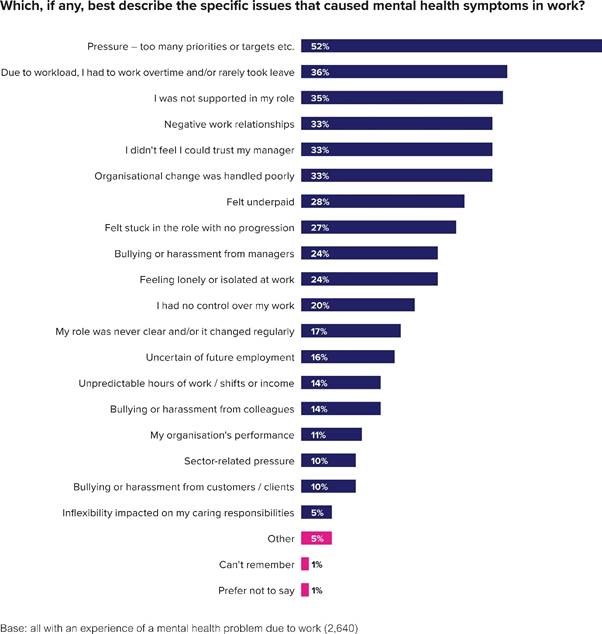Work is creating mental health issues for two in five employees
A report released by Business in the Community (BITC), in partnership with Mercer Marsh Benefits and BITC’s Wellbeing Leadership Team, ‘Time to Take Ownership’, shows that most employers do not acknowledge or deal with the adverse impact work has on employees’ mental health.

Mental health symbol Puzzle and head brain concept as a human face profile made from crumpled white paper with a jigsaw piece cut out on a rustic old double page spread horizontal wood background.
- Two in five (39%) UK workers experienced symptoms of poor mental health related to work in the last year
- More than six in ten (62%) managers said they had to put their company’s interests above staff wellbeing (every day, often or sometimes)
- 52% of those experiencing mental health problems related to work say this is due to pressure such as too many priorities or targets
Of the 39% of employees surveyed who have experienced poor mental health due to work, a third (33%) said that this was caused by negative work relationships (see table 1). One in four (24%) of those with work-related mental health problems explicitly cited bullying and harassment from their manager as a major cause. The report is based on YouGov survey data from more than 4,000 employees.
Mental and physical health needs to be considered equally important by employers. The report sets out key recommendations to show businesses how to create positive, inclusive workplace cultures that help rather than harm the mental health of the people who work for them.
Other key report findings:
- The survey revealed a significant disconnect between company board members’ perceptions of how mental health is treated within their companies and what the rest of the organisation thinks. More than half (51%) of those at a CEO or board level believed that their organisation effectively supports its staff, compared with 38% of those without line management responsibilities.
- There are barriers to managers providing effective support with more than six in ten (62%) managers saying they have had to put the interest of their organisation above staff wellbeing.
- Only 7% of all employees have received training to recognise workplace stress factors.
- One in three (33%) with mental health problems said that they felt ignored.
- Around one in ten (9%) were subject to disciplinary action, demotion or dismissal following the disclosure of mental health issues.
- One in ten workers resigned as a result, a figure which has plateaued since 2017.
Based on the report findings, Business in the Community has made three calls to action for businesses to help achieve better mental health for the UK workforce:
1. Create good work that enhances mental health. Good work is created by elements including security, fair pay and professional development.
2. Acknowledge and support employees experiencing poor mental health, whatever the cause.
3. Publicly report your wellbeing performance.
Denise Cranston, Head of Workplace Programmes at Business in the Community Northern Ireland, said:
“Mental health awareness has risen significantly in recent years, however, this research shows that too many employers are tinkering at the edges of change rather than making the fundamental differences that are really needed to improve their employees’ mental health.
“Those who want to be the best employers to attract top talent must remove the barriers to improving wellbeing, retention and productivity. Businesses are at their best when people are at their best.
“By creating a culture of transparency, employees will feel better placed to be open about their mental health experiences. It is our role as champions of responsible business to help companies address this issue and our Healthy Working Lives Conference scheduled for 20 March 2020 will help employers develop a ‘Whole Person’ approach by considering the key areas of employee wellbeing: Physical, Mental, Financial and Social & Emotional .”
Tony Wood, partner & UK leader, Mercer Marsh Benefits, said:
“Despite some signs of improvements, more action is needed to improve workplace mental health. Instead of pushing managers towards tactical ‘band-aid’ solutions, company leaders need to think strategically. Doing the right thing for their employees is also doing the right thing for their business.
“By encouraging empathy and an inclusive workplace culture, built on a foundation of psychological safety, companies can ensure lasting change in how we deal with mental health problems.”
Notes to editors
- To request a copy of the executive summary and full report, please contact Marie Gilmore, Communications Executive, Business in the Community on (028) 9046 0606 or marie.gilmore@bitcni.org.uk
- This report presents the key findings from a survey of 4,236 full and part-time employees in the UK that is representative of gender, age, industry sector, region and business size, excluding sole traders and those working alone. The survey explores mental health and wellbeing in the workplace with many questions tailored for managers and those who have a manager.
Spokespeople:
- Denise Cranston, Head of Workplace Programmes, Business in the Community.



